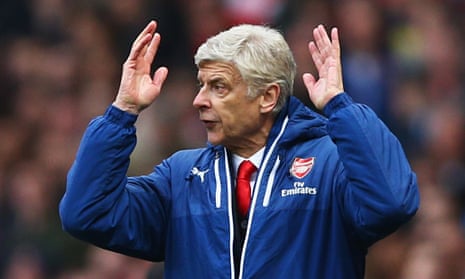This game had staggered into its final quarter-hour when Arsenal’s Santi Cazorla sensed his chance. Chelsea had been dragged out of position, distracted by Laurent Koscielny’s dart down the flank with the centre-half turned impromptu winger finding his team-mate on the edge of the area. Suddenly there was space for the Spaniard to exploit, rare time to measure a shot at goal. And yet the effort was wild, dragged horribly and wastefully beyond the far post.
It summed up the entire occasion. Cazorla hung his head as Arsenal’s chuntering support emitted a collective groan. José Mourinho’s side have the knack of draining composure from opponents and from Arsène Wenger’s teams more often than most. Aside from a pair of air-kicks by Mesut Özil and Danny Welbeck in stoppage time, that Cazorla opportunity was as close as Arsenal came to puncturing the resolve of the champions-in-waiting. A goalless draw extended Wenger’s winless run against Mourinho to 13 games and, with it, the persisting doubts over this Arsenal team’s ability to reclaim the title for the first time since 2004 when the Invincibles held sway.
Even if Chelsea had been defeated here the title would have been theirs to lose and it is likely they will claim it soon, possibly even on Sunday against Crystal Palace. For Arsenal this occasion had been more about laying down a marker for next season. They could have broken through a psychological barrier by following up that eye-catching league win at Manchester City, or that FA Cup success at Manchester United. A first triumph over a Mourinho side, a potential top-two finish and, maybe, the retention of the FA Cup would have delivered a campaign of clear and obvious progress. They may still achieve two of those three but now the build-up to the first meeting with Chelsea next season will be all too familiar.
It had seemed like their big chance merely because the visitors had been blunted by the absence of Diego Costa and Loïc Rémy and Arsenal had arrived on the back of the most eye-catching form of any team in the top flight in 2015. No one can match the 34 points they have accumulated since the turn of the year. There had been eight successive wins to suggest, tantalisingly, that they are mustering a team to mount a proper challenge. It is a familiar feeling. They had finished the 2012-13 season with a 10-match unbeaten run to secure fourth place. Last season their initial swagger became a stagger, the team left emotionally scarred by a 5-1 thrashing at Liverpool in early February.
This campaign’s surge had begun at around the same point, the side’s league record perfect since the derby defeat at White Hart Lane which occurred almost a year to the day from the humbling at Anfield. Balance had brought belief. This team benefits from full-backs in Héctor Bellerín and Nacho Monreal who are less gung-ho and can cramp opponents’ style, while a conventional defensive midfielder in Francis Coquelin, the Frenchman loaned to Charlton earlier in the season, has provided central stability. Coquelin waited 11 minutes before he flattened Eden Hazard, evidence of much-needed snarl. He was booked before the interval for pulling down the same player but even that offence almost seemed excusable, given the need for central presence.
And yet, for once, it was not the newfound rugged streak that let Arsenal down. Rather, it was caution in attack which proved their undoing, a wariness born of Chelsea’s potent threat on the counter. The intricate moves ran aground on the visitors’ stubborn defence, the home side’s old tendency to overplay restored, with the final pass too often either slightly overhit or marginally misplaced. “We have closed the gap [with Chelsea] but they had the experience at the back and could close this game down,” said Wenger.
“We lacked a bit of freedom of mind today. Maybe we were too conscious of their counterattacking. We didn’t play with enough freedom in the final third, didn’t make the right decisions. In the dangerous situations we create the decisions we usually take are quick and sharp. But today they weren’t always right. The final ball wasn’t there.”
So obdurate was the visitors’ back-line that Arsenal could not hope to prosper without that speed and accuracy on the killer pass. Instead they floundered, their invention as blunted as the visitors’ forward ranks. That will give Wenger food for thought. If United’s monopoly on possession at Stamford Bridge the previous weekend had been hailed as evidence of progress for Louis van Gaal’s side, even in defeat, then this was hardly all doom and gloom. Arsenal may have stumbled on their best form only once the title was gone but they do have a platform upon which to build for next term.
This team would look properly imposing with Petr Cech in goal, Morgan Schneiderlin patrolling midfield alongside Coquelin, or even another centre-half added to the ranks. Now it is up to Wenger to secure players of that calibre to complete the jigsaw, paying the prices it will take to lure them to the Emirates Stadium. We have been here before, too. Another test of the club’s ambition awaits.
